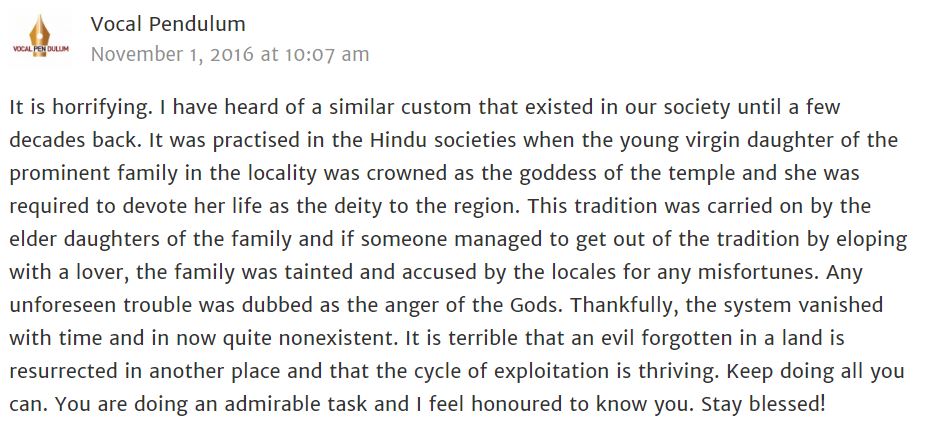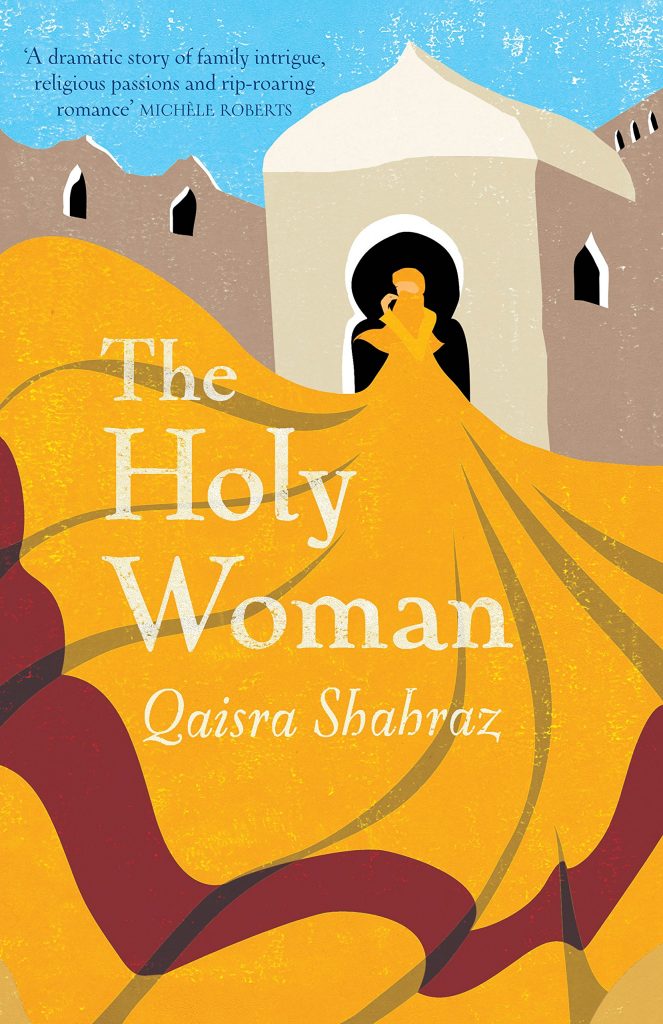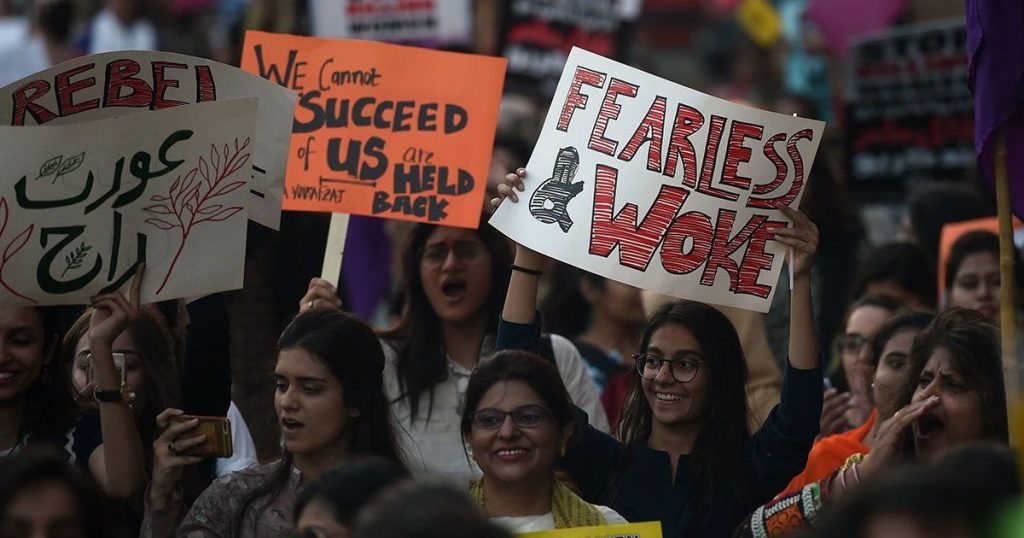Pakistan is home to a range of taboos. Some of these may come across as reasonable to a certain extent, perhaps those like public display of affection. Others, not so much. These happen to include things like Marital Rape, Blasphemy Laws and even something as simple as sex education. But there’s this one taboo that is even more under the wraps than all of these others, something known as Haq Bakshish. Translated as giving up the right to marry, and found among families of Sindh, Pakistan, it is the custom of marrying women to the Quran. Yes, you read that right. Not a man, not even a woman(homosexuality and Pakistan???) but literally a BOOK. Its origins nonetheless are widely disputed. Some believe that it was brought as a result of the centuries-old entwinement of Islam and Hinduism in the subcontinent whereas some believe it is purely a cultural practice.

A comment connecting the tradition’s origin to a Hindu practice.
The marriage takes place just like a normal wedding would. We know this through a report by The New Humanitarian in 2007 where they narrated the story of Zubaida, a 33-year-old who witnessed her cousin get married to the Quran and stated,
[perfectpullquote align=”full” bordertop=”false” cite=”” link=”” color=”” class=”” size=””]It was extremely odd – and, of course, very tragic. Fareeba, who is a very pretty girl and was then around 25 years old, was dressed as a typical bride, with red, sequined clothes, jewellery and ‘mehndi’ [henna] patterns on her hands and feet – but over all this she was draped in an enveloping dark ‘chaddor’ [veil]. There was music and lots of guests – but no groom.[/perfectpullquote]
Saadia Haq, a blogger quotes a similar story from her friend Shaista Bukhari who states how,
[perfectpullquote align=”full” bordertop=”false” cite=”” link=”” color=”” class=”” size=””]The victim can never dress in bright-colored clothes or leave the house, she stays indoors and cannot attend family events. At the most, she is allowed to do the ‘Hajj’ (pilgrimage) with a brother or blood relative. I have seen with my eyes, how such woman becomes psychologically ill, you see these type of weddings are done at an early age of sixteen to eighteen, as soon as the girl comes of marriageable age. Since they are so young they start believing in what the elders say that it is sinful to even to talk to anyone outside the family and other ridiculous ideas.[/perfectpullquote]
Among another report cited by Asharq Al-Aswat, an international newspaper, a woman married to the Quran fell pregnant and had a child. She had to hide from her relatives the fact that she had sexual relations claiming “that she did not know what had happened.” What followed was unseen absurdity where the locals believed that the woman “was similar to the Virgin Mary“, known more commonly among the Musalmaan as Hazrat Maryam AS. Thereby, they visited the newborn for blessings and to be healed.
After the wedding takes place, every victim of this heinous arrangement would have to spend the rest of their lives in a closed room. Only women and males not exceeding fourteen years of age are allowed to visit them. Behind the doors, they would be practicing religion forever or also be allowed to engage in hobbies like stitching as in the case of Fareeba. Furthermore, they memorize the Holy Quran along with allegedly having to tie its writing around their waist.
On the contrary, in cases where women dare to defy such practices, the result isn’t pleasant. We know this from 2011 when a couple by the name of Fahad Amin and Shahnila Naz consummated their marriage in opposition to their parent’s will. What ensued was a press conference by the duo in Lahore alleging how they were receiving death threats for going against the custom of Haq Bakshish. Shahnila even gave an interview to the Daily Times explaining her story:
[perfectpullquote align=”full” bordertop=”false” cite=”” link=”” color=”” class=”” size=””]Half the women in my family are married to the Quran: they are treated worse than servants and are forced to look after children and animals. One evening – she said – all of my family came to my room, sat on my bed, opened the Quran and said: ‘Here is your husband.’ I managed to escape; I got to Fahad and we got married in a court. But they are threatening me, I’m scared.[/perfectpullquote]
She went on to say that her own family had kidnapped her sister in law as a pawn to exchange her in.
[perfectpullquote align=”full” bordertop=”false” cite=”” link=”” color=”” class=”” size=””]I am pregnant and would certainly be killed if I returned…If my sister-in-law is not recovered, I am afraid my husband would have no option but to divorce me which would result in several deaths- mine, my unborn child’s, my husband’s and many others.[/perfectpullquote]
The depressing thing is that today no one really knows what happened to them. In fact, the original Daily Times article is not to be found online anymore. Ayesha Hasan from the Express Tribune reports how she “called the reporter who had reported the story of her press conference in an English paper and he had no idea, and neither did the police station concerned.“
[perfectpullquote align=”right” bordertop=”false” cite=”” link=”” color=”” class=”” size=””]But this wasn’t the only event that made this practice receive attention. Long before this, in 2001, we saw British Pakistani author Qasira Shahraz depict this tabooic tradition in her novel titled “The Holy Woman.” It sure did get a lot of people talking but just like any other hot topic, it soon died down with the tradition continuing.[/perfectpullquote]

Now, coming to the critical question, why does it even exist in the first place?
To understand this, we must resonate with the notion that there can be several reasons. I use “can” because there exists a lot of ambiguity and little content on this issue that to make a definite claim would be dishonesty.
Firstly, the majority of these families are believed to be Syed and hence they may not want to marry their women outside of their cast. This largely rests on an ill-conceived notion of the “Syeds”, those who can trace their lineage back to the Holy Prophet Muhammad P.B.U.H being somehow superior to the rest of us. Hence, if a suitable match within the family is not found, they are married to the Quran Instead.
Secondly, even if some of these families may not believe in the tradition of “not marrying outside their caste”, they would not want to transfer their wealth to someone outside the family which can happen for two reasons when one of their women gets married. Firstly, the old-age custom of dowry may prompt them to give up certain assets and secondly, if they happen to follow Islamic law, women have the right to inheritance and so would receive a share naturally. Since we’re considering people who would do anything contrary to Islam to preserve their wealth, the former reason seems more probable. Moreover, I also found no mention of the first reason during the research that I conducted. Hence, these women end up confined with a Holy Book.
But this begs the question, apart from pure greed, what could be the reason that they are so desperately ready to preserve their wealth? To answer this, we need to look at the power structure of these families. Most are believed to be feudal families and for the unfamiliar, feudalism has a strong correlation between the wealth one owns and the power they wield. Hence to retain their power, they would choose this barbaric way of sacrificing their women. But this again is one reason among the many that can exist. Unfortunately, due to the secrecy of the issue, we cannot collect a good amount of data to analyze.
It is important to note though that in the wake of such revelations, there were various attempts to criminalize such acts in the National Assembly over the years. However, they stalled with a breakthrough finally being found on Tuesday, 15 November 2011 when the Anti-Women Practices Act, 2011 authored by Dr. Donya Aziz of PML-Q passed. This outlawed several anti-women practices including the deprivation of women from an inheritance, forced marriages, the ritual of Wanni and one of them being Haq Bakshish – our subject matter in Section 498-C stating:
[perfectpullquote align=”full” bordertop=”false” cite=”” link=”” color=”” class=”” size=””]…forcing, arranging or facilitating a woman’s marriage with the Holy Quran is punishable with a jail term of maximum seven and minimum three years, along with a fine of five hundred thousand rupees.[/perfectpullquote]
Moreover, you’d be surprised to know that this act is even punishable under our blasphemy laws, particularly section 295-C which states,
[perfectpullquote align=”full” bordertop=”false” cite=”” link=”” color=”” class=”” size=””] Whoever wilfully defiles, damages or desecrates a copy of the Holy Qur’an or of an extract therefrom or uses it in any derogatory manner or for any unlawful purpose shall be punishable with imprisonment for life[/perfectpullquote]
Yet, despite this and the widespread declaration of it as Un-Islamic, to date, thousands of women can be estimated to still suffering and haven’t gotten justice. I draw this estimate based upon a report by an Arabic international newspaper Asharq Al Awsat who citing independent sources estimated 10,000 women in Sindh to be “Holy Brides.” Considering that we have seldom seen any court case undoing this injustice, it can be safely said that those thousands are still in captivity. This again is because of three main reasons:
- People in rural areas place little importance on the rights of women. This is due to cultural practices shrouding their religious obligations and hence there is no sense of urgency to act.
- Since the majority of this practice is believed to be among the “Syeds”, people turn a blind eye to them due to their lineage. Perhaps, someone should remind them of the Prophet Muhammad PBUH’s principles of justice.
- Most of Pakistan’s populace still does not know about this tradition and hence haven’t urged the government to take action against transgressors.

Image: Scroll.in
Keeping this in mind, I believe, it is our duty to take this up as one of our agendas in any future march or protest that we have fighting for women’s rights. Be it the Aurat March annually held across Pakistan or any other conference, this issue needs to be echoed out there for our executive authorities to take notice. Perhaps, some of our politicians take up this notice in a bid to cash in liberal votes? Who knows.




